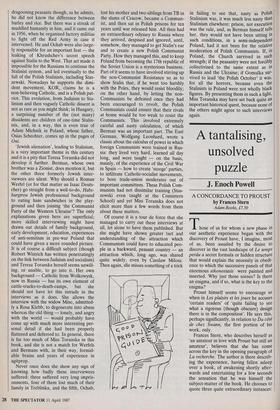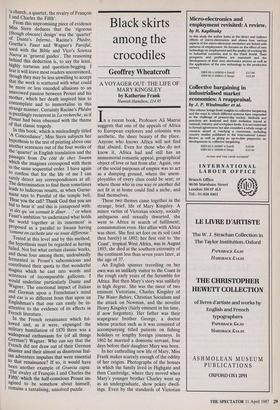A tantalising, unsolved puzzle
J. Enoch Powell
A CONCORDANCE TO PROUST by Frances Stern
Adam Books, £7.50
Those of us for whom a new phase in our aesthetic experience began with the discovery of Proust have, I imagine, most of us, been assailed by the desire to discover in the vast landscape of Le temps perdu a secret formula or hidden structure that would explain the necessity in obedi- ence to which the successive panels of that enormous eikonostasis were painted and inserted. Why just those scenes? Is there an enigma, and if so, what is the key to the enigma?
Proust himself seems to encourage us when in Les plaisirs et les fours he accuses 'certain readers' of 'quite failing to see what a rigorous (though obscure) design there is in the composition'. He says this, perhaps significantly, in relation to Du cote de chez Swann, the first portion of his work, only.
Frances Stern, who describes herself as 'an amateur in love with Proust but still an amateur', believes that she has come across the key in the opening paragraph of La recherche. The author is there describ- ing the experience, having fallen asleep over a book, of awakening shortly after- wards and entertaining for a few seconds the sensation that he was himself the subject-matter of the book. He chooses to quote three quite extraordinary instances: 'a church, a quartet, the rivalry of Francois I and Charles the Fifth'.
From this unpromising piece of evidence Miss Stern deduces that the 'rigorous (though obscure) design' was the 'quartet' of Dante's Inferno, Racine's Phedre, Goethe's Faust and Wagner's Parsifal, used with the Bible and Vico's Scienza Nuova as 'general guides'. The reasoning behind this deduction is, to say the least, highly tortuous and question-begging. I fear it will leave most readers unconvinced, though they may be less unwilling to accept that the work is scattered with what could be more or less encoded allusions to an unavowed passion between Proust and his mother, which her death inspired him to contemplate and to immortalise in this strange manner. Certainly Racine's Phedre is puzzlingly recurrent in La recherche, as if Proust had been obsessed with the theme of that classic tragedy. In this book, which is misleadingly titled 'A Concordance', Miss Stern subjects her hypothesis to the test of printing above one another sentences out of the four works of the 'quartet' in English translation and the Passages from Du cote de chez Swann Which she imagines correspond with them in the same sequential order. I have again to confess that for the life of me I can rarely detect any correspondences at all. The determination to find them sometimes leads to ludicrous results, as when Gurne- manz says to Parsifal of the temple bell, 'Hear you the call? Thank God that you are bid to hear it' and this is juxtaposed with: 'et des qu 'on sonnait le diner. . .' or when Faust's ambition `to understand what holds the world together at its innermost' is proposed as a parallel to Swann having comme en cachette une vie toute differente.'
Tested at this level and by this method, the hypothesis must be regarded as having failed. Not but what certain classsic Works, and those four among them, undoubtedly fermented in Proust's subconscious and contributed their quota to that wonderful magma which he cast into words and sentences of incomparable gallicism. I would underline particularly Dante and Wagner. The emotional impact. of Italian and German upon a Frenchman's mind and ear is so different from that upon an Englishman's that one can easily be in- attentive to the evidence of its effects in French literature.
In the French renaissance which fol- lowed and, as it were, expunged the military humiliation of 1870 there was a Widespread enthusiasm for (of all things German!) Wagner. Who can say that the French did not draw out of their German disaster and their almost as disastrous Ital- ian adventure impulses that were essential to that renaissance? If so, it would have been another example of Graecia capta. The rivalry of Francois I and Charles the Fifth' which the half-conscious Proust im- agined to be somehow about himself, remains a tantalising, unsolved puzzle.

























































 Previous page
Previous page